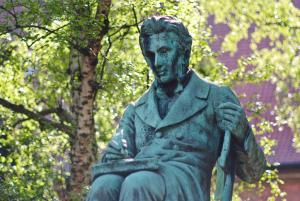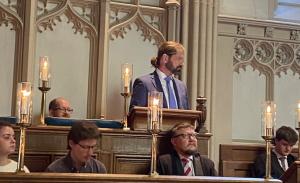“Subjectivity is truth.” That is the famous and famously cryptic sentence at the heart of Soren Kierkegaard’s very philosophical theology. It’s been back in my consciousness lately, though it’s been a few years since I’ve spent time with the elusive Dane. I’ve been reading some essays by Paul DeHart, a theologian at Vanderbilt, and Kierkegaard is one of the thinkers he often circles back to.
Kierkegaard and Me
It’s that way for many of us, it seems. Kierkegaard doesn’t like to let go. My journey with him began in college, and I remember it as an intense and exciting time of discovery. It was my senior year at Olivet Nazarene University, and our professor Craig Keen was leading a group of eager young evangelicals through the bulk of the texts. My classmates and I spent late nights in the library or in one another’s apartments, debating the odd vignettes of Either/Or and the surprising moves of the Concluding Unscientific Postscript. We tried to get inside Kierkegaard’s lifelong wrestling match with the Christian philosophy of the great G. W. F. Hegel. We puzzled through the key terms, trying to weave a coherent path through all we were learning. Faith, immediacy, the moment, repetition, paradox, contradiction. What did this playful, pugnacious writer mean by all this?
Within and around all those challenging ideas, there is, by philosophers’ standards, quite a lot of biographical intrigue. His sad love affair, a public argument with a pastor. His slightly too believable parables of a seducer. There was plenty there to keep the interest of 21 year-old holiness kids.
DeHart finds the center of Kierkegaard’s life and thought in “the restless will to be the self.” I think that’s a pretty good way of putting it. What’s more, that restless will is where his philosophy reveals a theological underbelly. “Subjectivity is truth” does not mean “individualism is the way,” or something Ayn Rand-ish like that. It means, instead, that there’s no discovery of the truth of the universe for humans without a turn inward. Without, that is, a courageous resolve to confront myself. This confrontation, in turn, becomes the surprising place where the God beyond my own will is revealed.
Stages on Life’s Way
A repeated motif in Kierkegaard’s writings describes this revelation through stages of life. They go something like this:
- Pursuing pleasure and immediate gratification, I am unreflective about my life. I assume I am living my life fully.
- As I begin to reflect, I suspect that I am not living my life, but my life is living me. I determine to live with moral intentionality, regardless of the lack of pleasure or reward such a life brings.
- I encounter God as a burst of grace within my restless struggle to live a good life. In a moment, or in a series of differently repeated moments more likely, I discover that my moral resolve was itself only preparation for the gift of life that God has for me. My turn within has opened me to the God beyond. I am not my own truth, but my subjective resolve has led me to truth.
Kierkegaard is sometimes called the father of existentialism. I think that’s not wrong, as long as we don’t make him into a mid- twentieth century Frenchman with a cigarette and no sense of humor. The turn inward is for him about what emerges as we pay attention to our existence, to our way of existing in the world. You might say that there’s a deep asceticism to Kierkegaard, though it’s not the asceticism of the desert fathers and mothers. He’s the desert father one would encounter in modern Copenhagen, going to the opera and sitting in a cafe reading the newspaper.
Kierkegaard on the Diagonal Way
For me, all of this makes him a companion on the diagonal way. Deep attention to the way I live in the world is the only trustworthy pathway toward God. “Inwardness,” he sometimes calls it. Kierkegaard never lets us rest with the easy assumption that God is lying around the world waiting to be discovered. Kierkegaard is not kind to the notion that a person, a church, or a culture can assume that God is on his/her/its side. This brings out some of his funniest or (and!) most vitriolic prose.
God is not “out there” to be found, because divinity shows up in the world in the paradox of a God-human. Truth shows up in the world as a treasure hidden in a field. Without the courage and resolve to go digging, we’ll see only the field. Just as the contemporaries of Jesus had to sit with hard or confusing teachings if they ever hoped to hear the divine voice speaking. The heart of the gospel, for Kierkegaard, is that God’s truth enters the world and makes things difficult.
Subjectivity is Truth
Prayer is difficult. Moral resolve is difficult. Faithfulness in marriage and family life is difficult. Loving one’s neighbor is difficult, before we even get to the question of strangers and enemies. But the greatest paradox of all, and the mysterious turn that delights and frustrates his readers, is that this difficult path is only a stage on life’s way. The dancer must train and retrain her steps, but this is all in service of the majestic leap from the dance floor. The Christian learns and relearns the habits of discipleship, but all this is in service of the moment of immediacy, the moment when God’s eternal gift bursts into our consciousness.
And still, avoidance of ourselves, our habits, our unique pathways of existence, is the surest way to avoid this surprise of divine presence. For Kierkegaard, the courage to face ourselves is the beginning of the courage to meet God. Our irreplaceable subjectivity is truth.
















